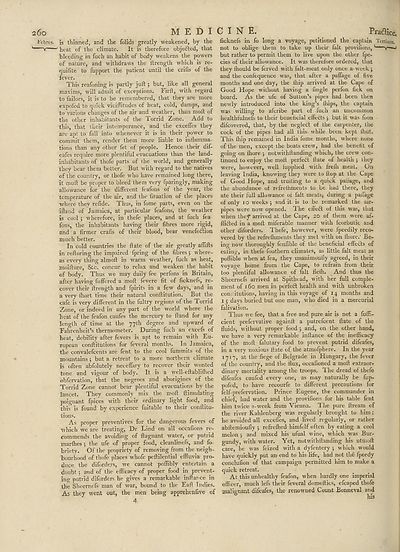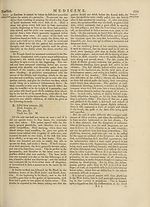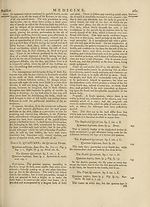Encyclopaedia Britannica, or, a Dictionary of arts, sciences, and miscellaneous literature : enlarged and improved. Illustrated with nearly six hundred engravings > Volume 13, MAT-MIC
(302) Page 260
Download files
Complete book:
Individual page:
Thumbnail gallery: Grid view | List view

26o
M E D I
Febres. is thinned, and the folids greatly weakened, by the
heat of the climate. It is therefore objected, that
bleeding in fuch an habit of body weakens the powers
of nature, and withdraws the ftrength which is re-
quilite to fupport the patient until the crifis of the
fever.
This reafoning is partly juft j but, like all general
maxims, will admit of exceptions. Firft, with regard
to lailors, it is to be remembered, that they are more
expoled to quick viciflitudes of heat, cold, damps, and
to various changes of the air and weather, than moft of
the other inhabitants of the Torrid Zone. Add to
this, that their intemperance, and the exceffes they
are apt to fall into whenever it is in their power to
commit them, render them more liable to inflamma¬
tions than any other fet of people. Hence their dif-
eafes require more plentiful evacuations than the land-
inhabitants of thofe parts of the world, and generally
they bear them better. But with regard to the natives
of the country, or thofe who have remained long there,
it muft be proper to bleed them very fparingly, making
allowance for the different feafons of the year, the
temperature of the air, and the fltuation of the places
where they refide. Thus, in fome parts, even on the
ifland of Jamaica, at particular feafons, the weather
is cool •, wherefore, in thefe places, and at fuch fea
ions, the inhabitants having their fibres more rigid,
and a firmer crafts of their blood, bear venefeftion
much better.
In cold countries the ft ate of the air greatly aflifts
in reftoring the impaired fpring of the fibres ; where¬
as every thing almoft in warm weather, fuch as heat,
moifture, &c. concur to relax and weaken the habit
of body. Thus we may daily fee perfons in Britain,
after having fuffered a moft fevere fit of ficknefs, re¬
cover their ftrength and fpirits in a few days, and in
a very ftiort time their natural conftitution. But the
cafe is very different in the fultry regions of the Torrid
Zone, or indeed in any part of the world where the
heat of the feafon caufes the mercury to Hand for any
length of time at the 77th degree and upward of
Fahrenheit’s thermometer. During fuch an excefs of
heat, debility after fevers is apt to remain with Eu¬
ropean conftitutions for feveral months. In Jamaica,
the convalefcents are fent to the cool fummits of the
mountains ; but a retreat to a more northern climate
is often abfolutely neceffary to recover their wonted
tone and vigour of body. It is a well-eftablilhed
obfervation, that the negroes and aborigines of the
Torrid Zone cannot bear plentiful evacuations by the
lancet. They commonly mix the moft ftimulating
poignant fpices with their ordinary light food, and
this is found by experience fuitable to their conftitu¬
tions.
As proper preventives for the dangerous fevers of
which we are treating, Dr Lind on all oCcafions re¬
commends the avoiding of ftagnant water, or putrid
marfhes *, the ufe of proper food, cleanlinefs, and fo-
briety. Of the propriety of removing from the neigh¬
bourhood of thofe places whofe peftilential effluvia pro¬
duce the diforde.rs, wTe cannot pofflbly entertain a
doubt ; and of the efficacy of proper food in prevent¬
ing putrid diforders he gives a remarkable inftance in
the Sheernefs man of war, bound to the Eaft Indies.
As they went out, the men being apprehenfive of
4
Pra&ice.
a voyage, petitioned the captain Tertiana.
CINE.
ficknefs in fo long
not to oblige them to take up their fait provifions,
but rather to permit them to live upon the other fpe-
cies of their allowance. It was therefore ordered, that
they fttould be ferved with falt-meat only once a-week j
and the confequence was, that after a paffage of five
months and one day, the ihip arrived at the Cape of
Good Hope without having a fingle perfon fick on
board. As the ufe of button’s pipes had been then
newly introduced into the king’s ihips, the captain
was willing to aferibe part of fuch an uncommon
healthfulnefs to their beneheial effects ; but it was foon
difeovered, that, by the neglect ot the carpenter, the
cock of the pipes had all this while been kept Ihut.
This Ihip remained in India fome months, where none
of the men, except the boats crew, had the benefit of
going on Ihore j notwithftanding which, the crew con¬
tinued to enjoy the moft perfect ftate of health j they
were, however, well fupplied with frelh meat. On
leaving India, knowing they were to flop at the Cape
of Good Hope, and trulting to a quick pafiage, and
the abundance of refrelhments to be had there, they
ate their full allowance ot fait meats, during a pailage
of only 1 o weeks 5 and it is to be remarked the air-
pipes were now opened. 1 he efteft of this was, that
when they- arrived at the Cape, 20 of them were af¬
flicted in a moft miferable manner with Icorbutic and
other diforders. Thefe, however, were fpeedily reco¬
vered by the refrelhments they met with on Ihore.’ Be¬
ing now thoroughly fenfible of the beneficial effects of
eating, in thefe fouthern climates, as little fait meat as
poflible when at fea, they unanimoully agreed, in their
voyage home from the Cape, to refrain from their,
too plentiful allowance of fait flelh. And thus the
Sheernefs arrived at Spithead, with her full comple¬
ment of 160 men in perfect health and with unbroken
coniiitutions, having in this voyage of 14 months and
15 days buried but one man, who died in a mercurial
falivation.
Thus Ave fee, that a free and pure air is not a fuffi-
cient prefervative againft a putrefeent ftate of the
fluids, without proper food *, and, on the other hand,
we have a very remarkable inftance of the inefficacy
of the moft falutary food to prevent putrid difeafes,
in a very noxious ftate of the atmofphere. In the year
1717, at the fiege of Belgrade in Hungary, the fever
of the country, and the flux, occalioned a moft extraor¬
dinary mortality among the troops. The dread of thefe
difeafes caufed every one, as may naturally be fup-
pofed, to have reeourfe to different precautions for
felf-prefervation. Prince Eugene, the commander in
chief, had water and the provifions for his table fent
him tivice a-Aveek from Vienna. The pure ftream of
the river Kahlenberg Avas regularly brought to him :
he avoided all exceffes, and lived regularly, or rather
abftemioufly •, refreffied himfelf often by eating a cool
melon ; and mixed his ufual Avine, which Avas Bur¬
gundy, Avith Avater. Yet, notAvithftanding his utmoft
care, he Avas feized Avith a dyfentery ; which would
have quickly put an end to his life, had not the fpeedy
conclufion of that campaign permitted him to make a
quick retreat.
At this unhealthy feafon, Avhen hardly one imperial
officer, much lefs their feveral dometties, efcaped thofe
malignant difeafes, the remwned Count Bonneval and
his
M E D I
Febres. is thinned, and the folids greatly weakened, by the
heat of the climate. It is therefore objected, that
bleeding in fuch an habit of body weakens the powers
of nature, and withdraws the ftrength which is re-
quilite to fupport the patient until the crifis of the
fever.
This reafoning is partly juft j but, like all general
maxims, will admit of exceptions. Firft, with regard
to lailors, it is to be remembered, that they are more
expoled to quick viciflitudes of heat, cold, damps, and
to various changes of the air and weather, than moft of
the other inhabitants of the Torrid Zone. Add to
this, that their intemperance, and the exceffes they
are apt to fall into whenever it is in their power to
commit them, render them more liable to inflamma¬
tions than any other fet of people. Hence their dif-
eafes require more plentiful evacuations than the land-
inhabitants of thofe parts of the world, and generally
they bear them better. But with regard to the natives
of the country, or thofe who have remained long there,
it muft be proper to bleed them very fparingly, making
allowance for the different feafons of the year, the
temperature of the air, and the fltuation of the places
where they refide. Thus, in fome parts, even on the
ifland of Jamaica, at particular feafons, the weather
is cool •, wherefore, in thefe places, and at fuch fea
ions, the inhabitants having their fibres more rigid,
and a firmer crafts of their blood, bear venefeftion
much better.
In cold countries the ft ate of the air greatly aflifts
in reftoring the impaired fpring of the fibres ; where¬
as every thing almoft in warm weather, fuch as heat,
moifture, &c. concur to relax and weaken the habit
of body. Thus we may daily fee perfons in Britain,
after having fuffered a moft fevere fit of ficknefs, re¬
cover their ftrength and fpirits in a few days, and in
a very ftiort time their natural conftitution. But the
cafe is very different in the fultry regions of the Torrid
Zone, or indeed in any part of the world where the
heat of the feafon caufes the mercury to Hand for any
length of time at the 77th degree and upward of
Fahrenheit’s thermometer. During fuch an excefs of
heat, debility after fevers is apt to remain with Eu¬
ropean conftitutions for feveral months. In Jamaica,
the convalefcents are fent to the cool fummits of the
mountains ; but a retreat to a more northern climate
is often abfolutely neceffary to recover their wonted
tone and vigour of body. It is a well-eftablilhed
obfervation, that the negroes and aborigines of the
Torrid Zone cannot bear plentiful evacuations by the
lancet. They commonly mix the moft ftimulating
poignant fpices with their ordinary light food, and
this is found by experience fuitable to their conftitu¬
tions.
As proper preventives for the dangerous fevers of
which we are treating, Dr Lind on all oCcafions re¬
commends the avoiding of ftagnant water, or putrid
marfhes *, the ufe of proper food, cleanlinefs, and fo-
briety. Of the propriety of removing from the neigh¬
bourhood of thofe places whofe peftilential effluvia pro¬
duce the diforde.rs, wTe cannot pofflbly entertain a
doubt ; and of the efficacy of proper food in prevent¬
ing putrid diforders he gives a remarkable inftance in
the Sheernefs man of war, bound to the Eaft Indies.
As they went out, the men being apprehenfive of
4
Pra&ice.
a voyage, petitioned the captain Tertiana.
CINE.
ficknefs in fo long
not to oblige them to take up their fait provifions,
but rather to permit them to live upon the other fpe-
cies of their allowance. It was therefore ordered, that
they fttould be ferved with falt-meat only once a-week j
and the confequence was, that after a paffage of five
months and one day, the ihip arrived at the Cape of
Good Hope without having a fingle perfon fick on
board. As the ufe of button’s pipes had been then
newly introduced into the king’s ihips, the captain
was willing to aferibe part of fuch an uncommon
healthfulnefs to their beneheial effects ; but it was foon
difeovered, that, by the neglect ot the carpenter, the
cock of the pipes had all this while been kept Ihut.
This Ihip remained in India fome months, where none
of the men, except the boats crew, had the benefit of
going on Ihore j notwithftanding which, the crew con¬
tinued to enjoy the moft perfect ftate of health j they
were, however, well fupplied with frelh meat. On
leaving India, knowing they were to flop at the Cape
of Good Hope, and trulting to a quick pafiage, and
the abundance of refrelhments to be had there, they
ate their full allowance ot fait meats, during a pailage
of only 1 o weeks 5 and it is to be remarked the air-
pipes were now opened. 1 he efteft of this was, that
when they- arrived at the Cape, 20 of them were af¬
flicted in a moft miferable manner with Icorbutic and
other diforders. Thefe, however, were fpeedily reco¬
vered by the refrelhments they met with on Ihore.’ Be¬
ing now thoroughly fenfible of the beneficial effects of
eating, in thefe fouthern climates, as little fait meat as
poflible when at fea, they unanimoully agreed, in their
voyage home from the Cape, to refrain from their,
too plentiful allowance of fait flelh. And thus the
Sheernefs arrived at Spithead, with her full comple¬
ment of 160 men in perfect health and with unbroken
coniiitutions, having in this voyage of 14 months and
15 days buried but one man, who died in a mercurial
falivation.
Thus Ave fee, that a free and pure air is not a fuffi-
cient prefervative againft a putrefeent ftate of the
fluids, without proper food *, and, on the other hand,
we have a very remarkable inftance of the inefficacy
of the moft falutary food to prevent putrid difeafes,
in a very noxious ftate of the atmofphere. In the year
1717, at the fiege of Belgrade in Hungary, the fever
of the country, and the flux, occalioned a moft extraor¬
dinary mortality among the troops. The dread of thefe
difeafes caufed every one, as may naturally be fup-
pofed, to have reeourfe to different precautions for
felf-prefervation. Prince Eugene, the commander in
chief, had water and the provifions for his table fent
him tivice a-Aveek from Vienna. The pure ftream of
the river Kahlenberg Avas regularly brought to him :
he avoided all exceffes, and lived regularly, or rather
abftemioufly •, refreffied himfelf often by eating a cool
melon ; and mixed his ufual Avine, which Avas Bur¬
gundy, Avith Avater. Yet, notAvithftanding his utmoft
care, he Avas feized Avith a dyfentery ; which would
have quickly put an end to his life, had not the fpeedy
conclufion of that campaign permitted him to make a
quick retreat.
At this unhealthy feafon, Avhen hardly one imperial
officer, much lefs their feveral dometties, efcaped thofe
malignant difeafes, the remwned Count Bonneval and
his
Set display mode to:
![]() Universal Viewer |
Universal Viewer | ![]() Mirador |
Large image | Transcription
Mirador |
Large image | Transcription
Images and transcriptions on this page, including medium image downloads, may be used under the Creative Commons Attribution 4.0 International Licence unless otherwise stated. ![]()
| Permanent URL | https://digital.nls.uk/192665088 |
|---|
| Attribution and copyright: |
|
|---|
| Description | Ten editions of 'Encyclopaedia Britannica', issued from 1768-1903, in 231 volumes. Originally issued in 100 weekly parts (3 volumes) between 1768 and 1771 by publishers: Colin Macfarquhar and Andrew Bell (Edinburgh); editor: William Smellie: engraver: Andrew Bell. Expanded editions in the 19th century featured more volumes and contributions from leading experts in their fields. Managed and published in Edinburgh up to the 9th edition (25 volumes, from 1875-1889); the 10th edition (1902-1903) re-issued the 9th edition, with 11 supplementary volumes. |
|---|---|
| Additional NLS resources: |
|

